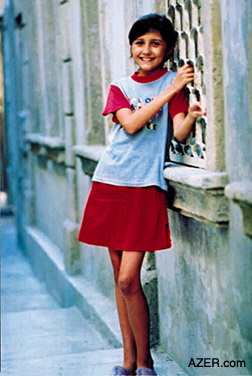|

Autumn 2004 (12.3)
Page
16
Reader's Forum
Respect
for Students
  Some
people argue that the Soviet education left us an enormous legacy,
which is reflected in the high literacy of the population in
Azerbaijan. That may be true, but we also inherited an ideology-based
curriculum, an extremely centralized management system and numerous
other problems. Some
people argue that the Soviet education left us an enormous legacy,
which is reflected in the high literacy of the population in
Azerbaijan. That may be true, but we also inherited an ideology-based
curriculum, an extremely centralized management system and numerous
other problems.
Left: One of the many friendly faces of
Ichari Shahar (Baku's Old City)
Today, in my opinion,
these negative drawbacks far outweigh any positive attributes.
Although each of these issues is worthy of attention and consideration,
the purpose of my letter is to discuss a completely different
problem of education: I would argue that education in Azerbaijan
suppresses students' personalities and fails to create open-minded
citizens. These two issues are directly interrelated.
I'll never forget my first semester studying in a U.S. university.
One day we were expecting a guest speaker-the author of the course
textbook-to visit our class. As we still had about 30 minutes
before his arrival, our professor asked class members to introduce
the independent projects that we were working on. As the last
student started to discuss his project, the guest speaker walked
in. It was a pleasant surprise for me to observe that our professor
did not interrupt the student but greeted the guest with a smile
and continued listening to the student.
Only after the student had finished his explanation did we turn
to recognize our guest. I was so surprised at the respect that
was shown to the student. Society is quite hierarchical in Azerbaijan.
It is not generally acceptable to greet or to be the first to
extend your hand to a person of higher rank. That means that
there is a very strict line between managers and employees as
well. Some people argue that this can be traced to our national
traditions and mentality. Perhaps so, but I'm convinced that
education also influences such behavior.
In educational circles, school rectors and other administrative
members are at the top of the hierarchical ladder. Classroom
teachers follow; students are on the bottom rungs. That is, since
students are the ones who need to be corrected, they are the
last ones able to express their opinions. Though corporal punishment
is rare these years, it's still quite common to embarrass and
sharply criticize students in the presence of their peers and
teachers. It's not by accident that whenever an adult person
is criticized publicly, he often says: "I was treated as
a school kid." Isn't it time we ask ourselves: "Is
this the way our children should be treated?"
This kind of attitude creates an inferiority complex in students.
Adults, in turn, use these very same techniques on the young
people that come under their supervision. Thus, it becomes a
vicious cycle.
Another problem relates to the nature of instruction. In American
schools, students are often involved in serious projects. Once
I observed a class of eighth graders (13-14 year olds) who were
discussing the U.S. constitution. Afterwards, they were given
an assignment to write a constitution for eighth graders. For
80 minutes, students set about to write a constitution as a group
project. When it was finished, the work was not set aside, but
students had to comply by the rules thereafter. I think such
activities give students a sense of accomplishment and maturity.
When students are taken seriously, they are capable of doing
important things, which can be applied to real life situations.
In Azerbaijan, students are rarely encouraged or allowed to do
independent work. Rather, they are taught to comply and agree
with their teachers. It is not by accident that many of us who
came from former Soviet countries to study in the United States,
experienced significant problems, especially in participating
in open discussions and presentations. We were afraid that our
ideas might not be viewed as "correct".
Of course, change takes time. But unless school administrators
and teachers receive appropriate training, I'm convinced that
educational reform will fail. If teachers hear terms like "interactive
instruction", "student-centered" or "child-friendly
instruction" without being trained how to apply such concepts,
nothing will change.
I grew up hearing stories from members of the older generations
about how they respected their teachers. They told me: "We
thought teachers were sacred, that they did not eat or sleep.
That they weren't like us." But I'm convinced such an approach
is totally outdated. It cannot raise up responsible, open-minded
citizens. Instead, students must grow up with the feeling that
people are equal-that includes principals, teachers and students.
All should be mutually respected. For a student to greet the
principal with a smile as an equal should not be perceived as
a violation of any hierarchy, but simply as normal behavior in
a free and democratic society.
Afet Dadashova, who studied under a Muskie grant in the United
States from 2002-2003, graduated from Rutgers University (New
Jersey) with Master's degree in Education. She has also worked
on the Education Reform Project of the Ministry of Education
and taught for two years at the Azerbaijan University of Languages.
Afet Dadashova
Baku
From
Azerbaijan
International
(12.3) Autumn 2004.
© Azerbaijan International 2004. All rights reserved.
Back to Index AI 12.3 (Autumn
2004)
AI Home
| Search | Magazine
Choice
| Topics
| AI Store | Contact us
Other Web sites
created by Azerbaijan International
AZgallery.org | AZERI.org | HAJIBEYOV.com
|